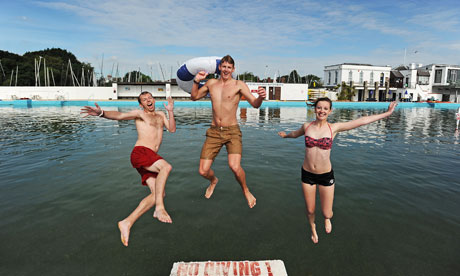
If you put a red dot on a map of Britain for every swimming pool that's fighting for survival, there'd be a nasty rash, top to bottom. Take Tarlair Lido in Aberdeen, recently granted £300,000 for immediate repairs which makes its swimming future imaginable, or Brighton's art deco Saltdean Lido, wrested by campaigners from a developer who was not, shall we say, "swimming friendly". Some are in locations that don't exactly smack of glamour – I'm thinking of the saved Walthamstow Forest College Pool, now run by a community interest company, or Moseley Road Baths, in a stunning Grade II listed building just south of Birmingham city centre, not a known tourist hotspot.
You might expect the campaigners – usually fighting councils which treat pools like problems rather than assets – to be embittered and disillusioned. I wouldn't blame them: the battles I was told about are most kindly described as bizarre. But the thing that joins all the red dots is a passion for swimming, and that passion reveals itself in the form of optimism. I understand the passion – it's one I share, particularly for outdoor swimming. The optimism I discovered when I toured three of these pools was an unexpected bonus.
The first was Lymington Sea Water Baths in Hampshire. Even unheated pools don't come cheap, and their takings are at the mercy of the weather. But to have sold the licence to run the place to a private company for a paltry sum, as the council has done, seems disdainful at best. This "unique space", as one swimmer called it, is in a corner of the marina right by the river estuary, and as I ask him: "Why do you swim here?" an Isle of Wight ferry chugs past, so he has to shout: "Because it's safe."
It surprised me to discover the pool is chlorinated, though the taste is distinctly salty. The trimmings are shabby and the pebbly bottomed pool is huge, 140m by 40m – it easily accommodates two wonky-tiered fountains in that familiar pool-paint blue. Beyond the low surrounding fence, a borrowed view of distant trees and a pick-up-sticks jumble of boat masts; you swim here to the constant clank and jingle of rigging.
The freedom of the open water is also a great leveller. "It's egalitarian," I'm told by a swimmer at my next stop, Shoalstone Seawater Pool in Brixham, Devon. Shoalstone has just opened, thanks to the work of an extraordinary group of Friends – perfect timing for the school holidays. But outdoor swimming isn't just for the holidays. Shoalstone began life as a natural rock pool and, over the years, it's been blasted out, levelled, painted, added to and beautified, mostly by volunteers.
The pool feels "at one with the sea," said Mark, a key and very optimistic Friend. "It gives kids an understanding of it, but with security." That sense of safety again, it's important: sea swimming is well and good, but it's not for all of us – we're not cowards, we're… OK, we're cowards, happy sensible cowards. The pool is stunning, a wedge of seawater with sunbathing terraces and little changing cubicles, a view across the whole of Torbay and the sea right there, safely.
"Shoalstone inspires a crazy love in people," said another swimmer. Swimming does that, I say – I think it's because it speaks to something in us, something about who we intrinsically want to be – free, equal, unencumbered. "Yeah," she agreed, "maybe", edging away.
We may all be equal in a swimming cap, but I'm the only one at Bude not in a wetsuit. Neoprene shields these swimmers from the cold, but it's not my cheapness that's keeping me unclad, it's my bloody-mindedness. I acclimatised, therefore I am.
My final red-dot destination, Bude Sea Pool, was basically dumped by the council like they were in a bad relationship; now it's run by another brilliant Friends group, a voluntary charity. Like Shoalstone, it's lifeguarded during the day and free to swim in. On the northern edge of Cornwall, it's more "of the sea" than either of the other two; as the tide begins to move in, it slinks across the low retaining wall like net curtains slide across a hotel window. Under a cliff and right next to Bude beach, this stunning pool was created 80-odd years ago as a safe swimming place in the hardcore Atlantic.
"If you're over 40 and from a 20-mile radius," said a Friend, "you'd have learned to swim here." That's a common reason people give for campaigning for their local pool. "It's because learning to swim takes years," he replied. "You have a good time, with your friends, over time – and that sticks with you."
As I leave, I give thanks to the extraordinary efforts that have kept these pools, and many others, in public use. On my way out of Bude I pass Splash, the local leisure centre, my idea of hot-fermented-wee hell, and I wonder if people will campaign to save Splash in times ahead. I don't see it. But, I remind myself, still salt-sticky and cold from the sea, it takes all sorts.

